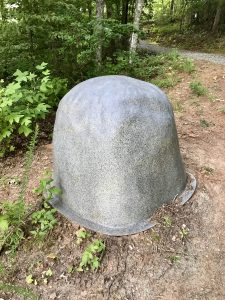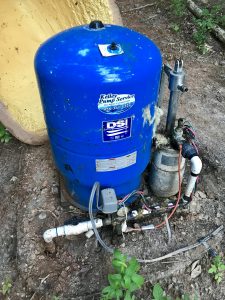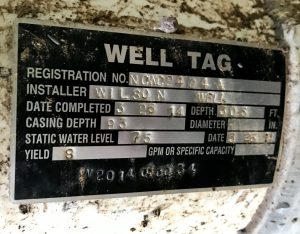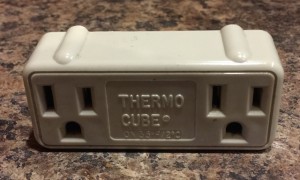Over the past decade+, I’ve either personally had drilled, had clients that drilled, or been involved in transactions where a new well had to be drilled here in Murphy, NC. The one thing I’ve learned; there is no such thing as a normal well in Western North Carolina. Each one is different with several main components: depth, yield, and quality.

Depth: Perhaps it’ll help to understand where water comes from underground. There are aquifers, or creeks, and veins of water hundreds of feet underground that you want to collect and bring to your faucets. While many areas like Florida and Eastern North Carolina can hit water in 10-50 feet, the mountains of Western North Carolina is often 100-400 feet and can even be deeper. In rare instances, you can have a well drilled that never finds water or has a low yield; more on that in a moment. Some old-timers believe that “witching” a well will help you maximize your odds of finding the best spot to drill your well so you never have a dry hole. The deeper your well, the more “reserve” you have; meaning, your well acts as a storage tank and the deeper it is, the more storage space you have.
Yield: Depth is only part of the equation; how much water your well can produce is another major component. Yield is how many gallons per minute your underground aquifers and veins of water pour into your well. This one is easy – the more the merrier. I’ve seen yield of under 1/2 gallon per minute (GPM) to artesian wells that put out so much water the instruments to measure yield pegged out and we only knew that it was 100+ GPM. Those are rare and 1-10 GPM is far more common. If your well produces a lower yield than the well company recommends for household usage, there are some great options to maximize it like a buried storage tank or fracking, which expands the crevices to try to get more water flow.

Quality: Western North Carolina is known for amazing water. In fact, many folks who live in Florida and other areas will tank water from here and bring it to their home because the water is so much better. pH is rarely a problem and any water quality issues we see usually are from rotten egg smell (sulfur) or red water (iron). The good thing about these water quality issues is they can almost always be resolved by a water filtration system. If it is needed, your well company can recommend the right system. They range from an inexpensive sediment filter (I think every home should have one. They protect your faucets and fixtures from sediment) to a tank-style system that costs around $1,650-3,200 depending on certain factors. Filtration technology has come a LONG way in the past decade and many of the systems require very little maintenance to produce the best water your taste buds have experienced.
Just a few personal experiences I’ve had:
- The well I use daily produces 8 GPM and feeds two homes, a barn, and waters our animals with no issues. Other than a $100 sediment filter, we have nothing on it and it produces the most amazing water ever.
- At our old house, the well was low yield with 3/4 GPM… and supplied about 10 houses. Fortunately, about 1/2 or better were part time occupants so it rarely had all 10 homes trying to get water. We CONSTANTLY had problems with water… until we installed a 1,500 gallon reservoir tank. That solved every problem we had because the storage tank supplied all the water to the houses and the well replenished it. It made the perfect buffer and we never had a supply issue again.
-

This is a typical well tag that is supposed to be on a well casing. It shows all kinds of useful information to include Yield (bottom left) and depth (center right). A developer drilled a well getting an astonishing 100+ GPM that had very high iron. The homeowners on the well had issues with laundry turning red due to the high iron content. They installed a $2,000 well filtration system that cleans itself so it requires extremely low maintenance. The system completely resolved the iron problems and the water is now extraordinary.
If you’ve wondered the basics on how wells work in Western North Carolina, I hope this helps! Looking for real estate? We would be honored to help. Give us a call at 1-866-687-7496 or contact us from our website and we’ll be there to assist.
Need a good well driller? Check out our Gotta Guy list with reputable local well drillers, contractors, and more.
We have private, shared, and community wells here. Learn the difference here.
John Poltrock




 Run your extension cord to the well and then plug in your Thermo Cube FIRST, if you opt to have one.
Run your extension cord to the well and then plug in your Thermo Cube FIRST, if you opt to have one.


